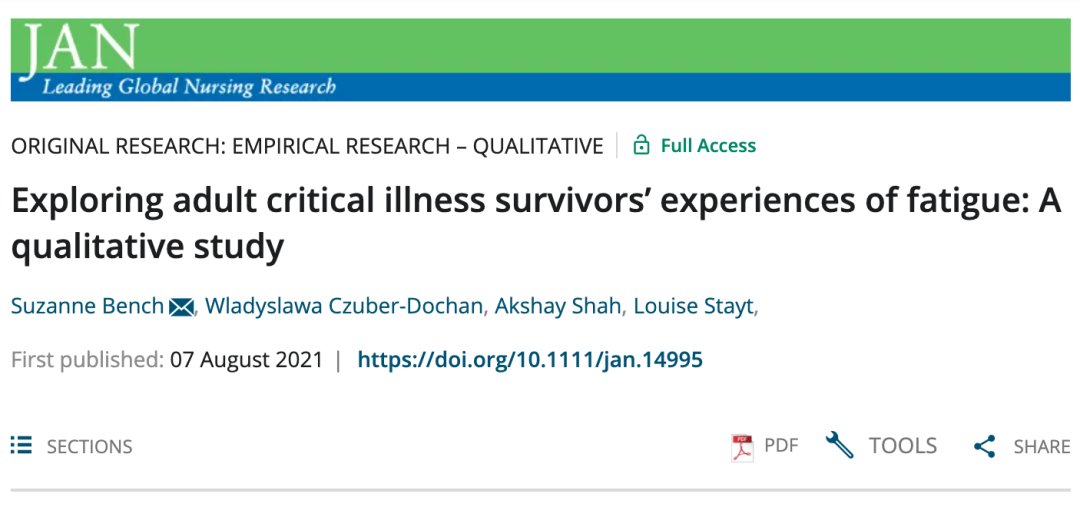
文章插图
Abstract
Aims
【f探索成年危重病幸存者的疲劳体验:一项定性研究】 To explore adult experiences of fatigue after discharge from an intensive care unit and identify potential management strategies.
Design
An exploratory qualitative study.
Methods
One to one audio-recorded semi-structured interviews with 17 adult survivors of critical illness in the United Kingdom, lasting up to 1 h, between September 2019 and January 2020. Anonymised and verbatim-transcribed interview data underwent a standard process of inductive thematic analysis as described by Braun and Clarke.
Findings
Three themes were identified: fatigue is different for everyone; complex interrelating interactions; and personalised fatigue strategies. Fatigue was described as a distressing symptom, unique to the individual that causes an array of complex, often long-term interrelating impacts on the survivor and their wider family, made worse by a lack of understanding, empathy and support resources. Support from others, alongside interventions such as exercise, good nutrition, information and alternative therapies are used by survivors with variable degrees of success.
Conclusions
This qualitative study reports peoples’ experiences of fatigue after critical illness. Findings highlight the significant impact it has on people's lives and those of their family and friends.
摘要翻译(仅供参考)
宗旨
探讨成人从重症监护室出院后的疲劳经历,并确定潜在的管理策略。
设计
一项探索性的定性研究。
方法
在 2019 年 9 月至 2020 年 1 月期间,对英国 17 名成年危重疾病幸存者进行了一对一的录音半结构化访谈,持续时间长达 1 小时。匿名和逐字转录的访谈数据经过了归纳主题分析的标准过程正如布劳恩和克拉克所描述的那样。
发现
确定了三个主题:疲劳因人而异;复杂的相互关联的相互作用;和个性化的疲劳策略。疲劳被描述为一种令人痛苦的症状,是个体独有的,它会对幸存者及其更广泛的家庭造成一系列复杂的、往往是长期相互关联的影响,并且由于缺乏理解、同情和支持资源而变得更糟。其他人的支持,以及锻炼、良好营养、信息和替代疗法等干预措施,被幸存者使用,取得了不同程度的成功。
结论
这项定性研究报告了人们在患重病后疲劳的经历。调查结果强调了它对人们及其家人和朋友的生活产生的重大影响。
推荐阅读
- 教育|多国出招助未成年人摆脱网瘾
- 教育|多国出招助未成年人摆脱网瘾(国际视点)
- |美女教师无德,祸害三名未成年学生!一场报复打开,丢了卿卿性命
- 闯关|【保护和关爱未成年人健康成长】如东县实验小学“双减”落地重塑教育生态
- 园林美学|南京市第九初级中学:园林美学入课堂 "双减"下教学模式新探索
- 民居|230余名国际学生“云探索”山西古建
- 儿童戏剧|儿童戏剧教育 探索诗意表达
- 生活|腾讯游戏发布寒假限玩日历,未成年人最多玩14小时还有调休
- 安顺学院|高校探索发展新路:安顺学院将更名为贵州文化旅游学院,纳入省管
- 伊莫金|4集拍光成年人的噩梦,跪求国内赶紧翻拍!











